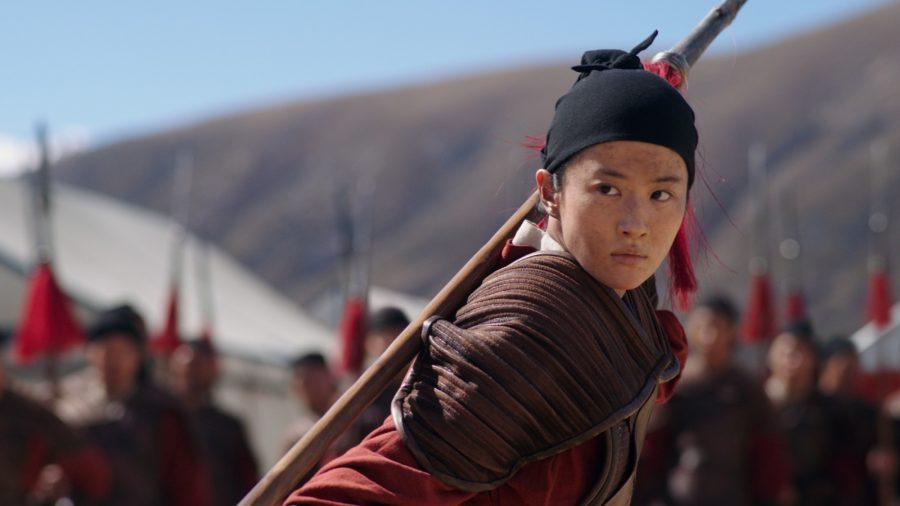The live action remake of Disney’s animated classic Mulan premiered in the United States on Sept. 4 on the corporations streaming site, Disney Plus, for $29.99. The movie has faced a rise in controversy after the movie aired when viewers noticed a special thank you in the credits addressed to multiple Chinese governmental agencies. Organizations thanked, such as The Turpan Public Security Bureau and government agencies from the Xinjiang Province, are under global scrutiny for their suspected involvement in human rights violations.
In the Xinjiang Province, located in Northeastern China, there are ‘reeducation’ camps with detained Uighur Muslims. It is estimated that between 1 and 2 million Uighur people have been detained and sent to camps. It is speculated what truly occurs within camps, however, global peace organizations and human rights activist claim that prisoners are subjected to brutal conditions, forced labors, torture, and even sterilization. The Chinese government denies all allegations of human rights violations, and insists the camps are voluntary educational centers, and were instituted to fight back against a rise in internal terrorism.
Chinese government agencies controlling this region were placed on a list created by the United States identifying potential human rights violators. In response to this report, the U.S. placed sanctions and visa restrictions on the country. This is the same area Disney chose to film scenes for their newest princess reboot, and it was these organizations they publicly thank in the credits.
The Mulan controversy did not stop there. The lead actress Liu Yifei, during the film’s production, released a post on social media supporting the police of Hong Kong. The city of Hong Kong was a British province until the late 1990’s, and subsequently have a much more democratic ideology than their now parent nation, China. Civilian protests in recent times have reached an all time high, with pro-democracy activists filling the streets. The protests reached full force following the Chinese government passing the extradition bill, which increased governmental security laws within the city. Protests clash with police in the streets daily, and altercations have become exceedingly violent. The police of Hong Kong are accused of using excessive force on protesters, are restricting the basic rights of the people of Hong Kong. In Liu Yifei’s post she lends her support to the police of Hong Kong, and effectively is taking the side of the Chinese government in the situation, as opposed to the civilian fight for democracy.
This is not the first time Disney has experienced controversy regarding one of their films, as they have a long history with struggling to represent full equality in their work. The company, upon the launch of Disney Plus, added Disney classics dating as far back as the 1940’s to their movie catalogs. Some films received a disclaimer warning viewers of potentially racist stereotypes being depicted. Movies such as Dumbo depicted cartoon crows with overly exaggerated black stereotype dialect, and even gave one the name Jim Crow, which was term applied to segregation laws in the South. Other childhood Disney classics made their way onto the list such as Peter Pan, and the Jungle Book. Activists criticized the company for failing to add the disclaimer to more movies with offensive racial stereotypical depictions, such as Pocahontas or Aladdin.
Disney’s history of the representation of women also shares the same troubling history, particularly in the princess movie collection. The earliest princess movies depicted dainty, white, young women relying the help of a man to save her. These movies include classics such as Snow White or Sleeping Beauty, showing an outdated version of what femininity is. Princess movies released later include more diversity, however, are still depicted as thin, feminine, and waiting for a man.
Disney has traditionally been run by powerful, white men, and has failed to illustrate equality on countless occasions. The inclusion of diversity is crucial, not only in on-screen cast, but behind scenes production as well. Many feel that was one of the major flaws in the Mulan production, as well as many others in the past. A movie that was meant to be a win for the Asian community, ended up greatly lacking Chinese representation. Activists are circulating the hashtag #BoycottMulan on social media, pleading with the public to not support the film. They feel by supporting the film, you are not only turning a blind eye to social injustice, but you will inadvertently be supporting police brutality, racial injustice and the systematic incarceration of Muslim Uyghurs.
When you settle down to choose your next movie, keep this in mind and really think about what kind of business you are giving your money to.

Lauren is a political science major, she is from Baltimore.









